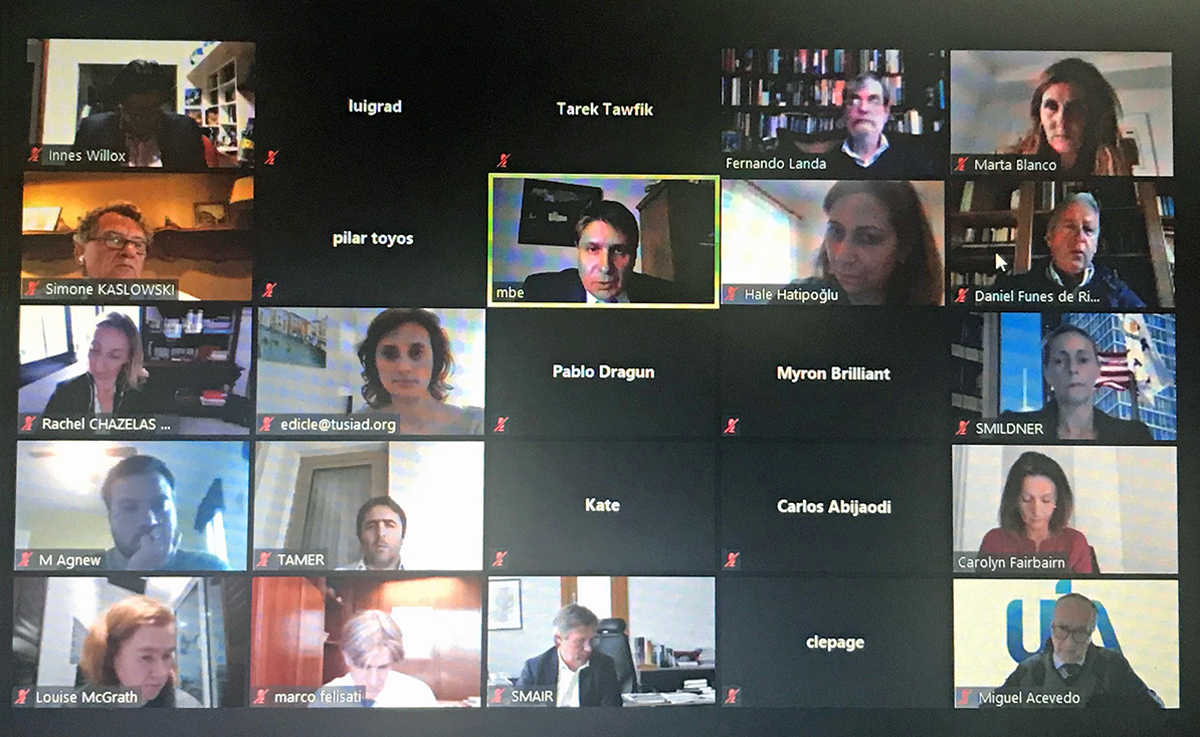BusinessEurope Headlines No. 2020-18
International trade and investment are key to sustain the economic recovery

“This crisis has prompted governments around the world to take some decisions that could be justified on a temporary basis, but if maintained they could hamper the economic recovery we are all aiming for", said Director General Markus J. Beyrer in a meeting of the Global Business Coalition (GBC) on 12 May. He explained that from closure of borders to export restrictions, these measures were taken as a response to the COVID-19 crisis but they must be lifted once the crisis is over. "Keeping markets open and trade and investment flowing will be essential to put our economies back on the growth path”, Beyrer added. During the meeting, GBC members discussed key priorities for the international business community to ensure a successful exit strategy and fast economic recovery. Businesses around the world are concerned about the temptation to resort to protectionism and inward looking policies as a response to this unprecedented crisis. “International cooperation and international institutions like the World Health Organisation, the International Monetary Fund or the World Trade Organisation are critical in coordinating a global response to a global crisis and they will also be critical for the economic recovery", Beyrer highlighted, adding that this crisis is also a call to strengthen international rules and ensure that we will have a level playing field that allows every country around the world to have a sustainable economic recovery.
Contact: Luisa Santos
Posting of Workers: letter on deadline to transpose revised directive
 BusinessEurope’s President, Pierre Gattaz, on 5 May sent a letter to European Commission President Ursula von der Leyen regarding the current deadline for the transposition of the Revised Directive on Posting of Workers. He highlighted that the deadline of 30 July 2020 is not a workable timeframe because EU member states will not have put in place the necessary tools to inform companies on the way to comply with the rules on posting of workers. It will therefore create legal uncertainties and an additional administrative burden for companies in this really difficult period.
BusinessEurope’s President, Pierre Gattaz, on 5 May sent a letter to European Commission President Ursula von der Leyen regarding the current deadline for the transposition of the Revised Directive on Posting of Workers. He highlighted that the deadline of 30 July 2020 is not a workable timeframe because EU member states will not have put in place the necessary tools to inform companies on the way to comply with the rules on posting of workers. It will therefore create legal uncertainties and an additional administrative burden for companies in this really difficult period.
![]() Contact: Jessie Fernandes
Contact: Jessie Fernandes
State aid is needed to ensure liquidity
 The Head of Unit State Aid Policy and Case Support at the European Commission's Directorate-General for Competition, Koen van de Casteele, attended the meeting of BusinessEurope’s State Aid working group on 5 May. He gave an overview about the measures taken and planned to deal with the COVID-19 pandemic and the work on evaluating the EU State Aid rules. The Commission has approved a significant amount of aid to provide liquidity for companies and continues to monitor the application of the rules to help companies in need because of the coronavirus outbreak. Work regarding the review of the existing state aid rules continues and this will also be considered in view of the need to have a recovery plan after the crisis.
The Head of Unit State Aid Policy and Case Support at the European Commission's Directorate-General for Competition, Koen van de Casteele, attended the meeting of BusinessEurope’s State Aid working group on 5 May. He gave an overview about the measures taken and planned to deal with the COVID-19 pandemic and the work on evaluating the EU State Aid rules. The Commission has approved a significant amount of aid to provide liquidity for companies and continues to monitor the application of the rules to help companies in need because of the coronavirus outbreak. Work regarding the review of the existing state aid rules continues and this will also be considered in view of the need to have a recovery plan after the crisis.
Contact: Erik Berggren
Discussion with European Commission on VAT priorities
 In view of the European Commission's upcoming "Action Plan To Fight Tax Evasion and To Make Tax Simple and Easy", the Value Added Tax (VAT) group was pleased to welcome Patrice Pillet, Head of Unit on VAT in the European Commission's Directorate-General for Taxation and Customs Unions (DG TAXUD), to its meeting on 12 May. Pillet provided an overview of the Commission’s priorities for the coming years in the area of indirect tax, highlighted recent VAT-reforms that were made, and replied to questions from the group. The VAT group welcomed the European Commission's support for simpler and modernised VAT-rules and encouraged the Commission to streamline VAT procedures as much as possible, adding that the fewer differences there are in terms of administration, reporting, invoicing, etc, the easier it will be for businesses, and in particular SMEs, to trade in the Single Market.
In view of the European Commission's upcoming "Action Plan To Fight Tax Evasion and To Make Tax Simple and Easy", the Value Added Tax (VAT) group was pleased to welcome Patrice Pillet, Head of Unit on VAT in the European Commission's Directorate-General for Taxation and Customs Unions (DG TAXUD), to its meeting on 12 May. Pillet provided an overview of the Commission’s priorities for the coming years in the area of indirect tax, highlighted recent VAT-reforms that were made, and replied to questions from the group. The VAT group welcomed the European Commission's support for simpler and modernised VAT-rules and encouraged the Commission to streamline VAT procedures as much as possible, adding that the fewer differences there are in terms of administration, reporting, invoicing, etc, the easier it will be for businesses, and in particular SMEs, to trade in the Single Market.
Contact: Pieter Baert
Efficient capital markets are crucial to finance companies
 The Financial Affairs working group of BusinessEurope met on 7 May to exchange views on how the COVID-19 situation affected the financing of companies. Peter Kerstens of the European Commission's Directorate-General for Financial Stability, Financial Services and Capital Markets Union (DG FISMA), gave a presentation about the Commission’s economic response to the outbreak. In applying the full flexibility of the EU’s banking rules and proposing targeted legislative changes, the Commission enables banks to keep on providing liquidity to those in need and the on-going work regarding the Capital Markets Union will also reflect the need for well-functioning capital markets to finance the recovery.
The Financial Affairs working group of BusinessEurope met on 7 May to exchange views on how the COVID-19 situation affected the financing of companies. Peter Kerstens of the European Commission's Directorate-General for Financial Stability, Financial Services and Capital Markets Union (DG FISMA), gave a presentation about the Commission’s economic response to the outbreak. In applying the full flexibility of the EU’s banking rules and proposing targeted legislative changes, the Commission enables banks to keep on providing liquidity to those in need and the on-going work regarding the Capital Markets Union will also reflect the need for well-functioning capital markets to finance the recovery.
Contact: Erik Berggren
Antitrust rules: more guidance is welcome to encourage cooperation
 BusinessEurope’s Competition working group welcomed Maria Jaspers, Head of the Unit Antitrust Case Support and Policy at the European Commission's Directorate-General for Competition, to its video conference on 6 May. She explained how the Commission’s work on antitrust has changed following the outbreak of the coronavirus. The DG Competition and national competition authorities are providing guidance on the compatibility of certain cooperation initiatives with antitrust law and the Commission has adopted a Temporary Framework Communication which sets out the main criteria that the Commission will follow when assessing cooperation projects aimed at addressing a shortage of supply of essential products and services. The Commission is also continuing the evaluation of the existing rules on horizontal and vertical agreements and will consult on the rules regarding the definition of markets.
BusinessEurope’s Competition working group welcomed Maria Jaspers, Head of the Unit Antitrust Case Support and Policy at the European Commission's Directorate-General for Competition, to its video conference on 6 May. She explained how the Commission’s work on antitrust has changed following the outbreak of the coronavirus. The DG Competition and national competition authorities are providing guidance on the compatibility of certain cooperation initiatives with antitrust law and the Commission has adopted a Temporary Framework Communication which sets out the main criteria that the Commission will follow when assessing cooperation projects aimed at addressing a shortage of supply of essential products and services. The Commission is also continuing the evaluation of the existing rules on horizontal and vertical agreements and will consult on the rules regarding the definition of markets.
Contact: Erik Berggren
Calendar 
- 5 June: BusinessEurope Council of Presidents
- 22-26 June: EU Sustainable Energy Week 2020
- 9-10 September: 8th International Conference on Sustainable Development
Reminder: please have a look at our privacy policy